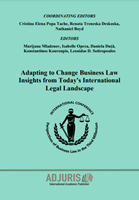
Consequences for the Breach of Company Directors Duties. Perspective of the United States of America
Consequences for the Breach of Company Directors Duties. Perspective of the United States of America
Keywords: director; duties; breach; consequences; USA;
The company good management by its directors provides a high operational stability during the course of its activity, which consequently will find reflection in its profits. In this managing process, directors often have to face with situations, where the consequences of their actions cannot be clearly and unambiguously predicted, and decisions taken are risky. These decisions, in the best scenario, may generate profits but can also lead to unfavorable consequences for the commercial company itself and third parties involved in relations with this commercial company. To minimize these risks, the legislator have to clearly define the duties and responsibilities of the company directors. The latteris one of the legal instruments that serves to coordinate the interests of the directors with the interests of the corporation, its shareholders and third parties. In the present paper, through a legal assessment, special attention has been paid to the consequences for the breach of company directors’ duties in the US perspective, which are divided into three categories: responsibilities towards the corporation, shareholders and third parties. Due to the fact the jurispudence and specifically the courts of Delaware in the USA has played an important role in the resolution and interpretation of issues related to directors duties and responsabilities, which were not dealt with in detail in the legislation or corporate acts, this paper will be focused also in one of the most important institutes of American law- “business judgement rule”, which was created by the courts in defense of directors rights. The main aim of this paper is to analyze the US doctrine, legal provisions, which regulate the company directors’ responsibilities, as well as the court practice in this regard. Also, an important objective of this paper is that it may serve as an important basis for further comparative studies in this field with other jurisdictions. Such analysis is based on the qualitative method, which contains also the research, analytical, descriptive, interpretive methods. The result of this paper will stimulate debate in the academic level and contribute to further improvements of our company legislation, as well to the legal doctrine in Albania that lacks such.
More...